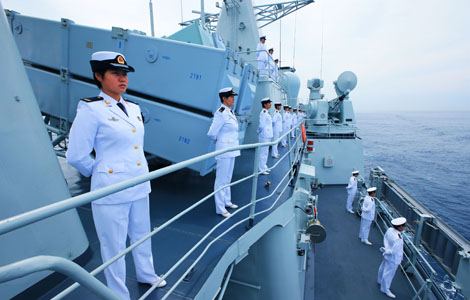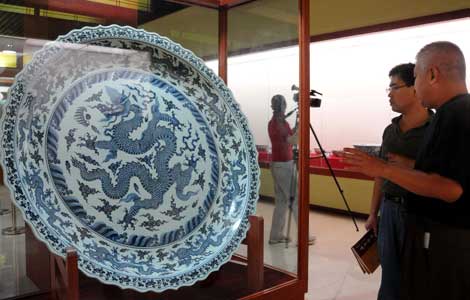Cooperation of mutual benefit
Updated: 2013-08-02 07:08
By Huang Guobo (China Daily)
|
||||||||
China helps Africa in trade and economic development but is not a major player in resources and energy markets
Relations between China and Africa have developed rapidly in recent years, and with the establishment of a new strategic partnership their cooperation has reaped tremendous results. Sino-African trade and economic cooperation have proved to be especially fruitful, becoming increasingly deeper and wider.
This is attributable to the fact that both China and Africa have adhered to the principle of equality and mutual trust in politics, have capitalized on their economic complementarities and have spared no efforts to serve each other's interests in cooperative projects with an approach that upholds willingness, independence, equality, and a win-win situation. Friendly cooperation is the common desire of people both in Africa and in China and is an irresistible trend.
The current structure of Sino-African trade, determined by their respective stages of development, resources, labor, and technology, is a natural choice. On the one hand, imports from China that Africa itself is unable to produce or cannot produce cost-effectively, can satisfy the needs of Africans during current economic conditions. On the other hand, Africa is an import market for Chinese products and resources for which it has no comparative advantages, and China's huge market has created a stable demand for African-made products. By taking advantage of each other's strengths, China and Africa have both achieved higher trading efficiency and benefits. By meeting market laws and each other's needs, bilateral trade between the two boomed amidst the global economic crisis.
In 2012 China became Africa's largest trading partner for the fourth consecutive year, with a trade volume nearing $200 billion and representing an average annual increase of 30 percent over the past decade. Africa's exports to China grew twelvefold during the past decade, generating about 5 percent of its GDP. China has become Africa's fastest-growing export market, playing an important role in driving its economic growth.
China continues to expand its investments in Africa and to increase aid, with a focus on improving Africa's ability to develop independently by helping it advance its technology, nurture talent, and upgrade its industries, so as to create more jobs and to balance social development. Over the past decade, China's direct investment position in Africa has grown fortyfold to approximately $20 billion, with investment projects involving more than 50 countries and over 80,000 local employees.
According to the Center for Global Development, a US think-tank, between 2000 and 2011 China provided $75 billion in aid to Africa, helping it build roads, bridges, hospitals, and schools and to drill wells and nurture more than 40,000 talents. For example, China established six cooperative economic and trade zones in five African countries to develop the processing industries, creating more than 10,000 jobs for local people. The power plant in which it invested in Ghana generates 15 percent of the total electric power in the country. The telecommunications network it built in Ethiopia has raised the coverage of the country's communications from nearly zero to 64 percent. The China-Nigeria Friendship Primary School built with Chinese donations has eased pressures for elementary education from 300 villages, its charities in Sudan have benefited more than 2 million people, and the China-sponsored occupational training centers in Angola and Libya have trained a large number of people. China also provides loans and debt reductions or exemptions in support of African development.
China lags far behind the developed countries in terms of its volume of trade and investment in Africa but its trade and investments have a more balanced structure.
China is not a major player in Africa's resources and energy markets. Statistics reveal that China's direct investments in oil, gas, and mineral resources constitute less than one-third of its total direct investments in Africa, whereas they account for 70 percent of the investment from France, 59 percent of the investment from the United States, and 47 percent that of the United Kingdom. Of the foreign investment in Africa's oil, gas, and mineral resources industries, 70 percent comes from the US, the UK, France, Australia and Canada combined, whereas less than 10 percent is from China. Oil exports to China account for only 18 percent of Africa's total oil exports, well below the amount exported to the EU and the US.
As of the end of 2011, China contributed 3 percent to the international investment position and 7 percent to investment flows in Africa.
Chinese enterprises are at a disadvantage, compared to those from the developed countries, in terms of seeking investments in Africa as China is a relatively new investor in the continent and some of the developed countries have language and culture advantages. Chinese businesses, as latecomers, do not have much choice in terms of selecting investment projects and the conditions for investments may not be very favorable.
The facts are irrefutable proof that trade and economic cooperation between China and Africa is mutually beneficial. Through the development of their cooperation China and Africa can offer more opportunities to each other. But to deepen their cooperation, Chinese businesses need to better understand the needs of the African people so as to strengthen their knowledge of the laws, cultures, and customs in Africa and better perform their social responsibilities in terms of environmental protection, local employment, building a corporate image, and delivering technical training to match and serve the local people in the ways they desire. African countries also need to enhance their communication with Chinese businesses to deepen mutual understanding, create a favorable environment for trade and investment and ensure the legal rights and interests of Chinese businesses.
On his recent trip to Africa President Xi Jinping conveyed the Chinese people's best wishes and willingness to work together with the African people, announcing to the world that China will always be Africa's "all-weather" friend and partner, setting the direction for the future development of their relations. China and Africa should keep up with the times, ignore distractions, and jointly concentrate on advancing trade and economic cooperation to a higher level.
The author is chief economist of the State Administration of Foreign Exchange.
(China Daily USA 08/02/2013 page15)
Most Viewed
Editor's Picks

|

|

|

|

|

|
Today's Top News
Food program aims to address security
China faces world's worst managerial shortage
Soybean is king in American exports to China
China sails through 'first island chain'
US should reclaim 10% share
Chinese worry about image abroad
China blasts US Senate resolution
NSA chief details program at hackers' conference
US Weekly

|

|















